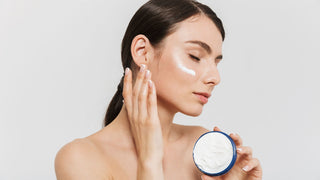Skincare Routines 101 and Steps You Need to Take
A well-structured skincare routine is key to achieving healthy, glowing skin. By addressing your skin's unique needs through specific steps, you can create a regimen that not only maintains balance but also supports your skin’s overall health. By following these skincare routine steps, you can create a personalized regimen that keeps your skin healthy and glowing. Whether you're just starting out or refining your existing routine, each step plays an important role in supporting your skin’s overall well-being.
Step 1: Cleansing – The Foundation of Healthy Skin
Cleansing is the first and most important step in any skincare routine. It removes dirt, oil, makeup, and impurities that accumulate on your skin throughout the day or night.
Types of Cleansers
- Gel Cleansers: Ideal for oily and combination skin, these help remove excess oil and leave skin feeling fresh.
- Cream Cleansers: Best for dry or sensitive skin, these provide gentle hydration while cleansing.
- Foaming Cleansers: Effective for oily or acne-prone skin, these offer a deeper clean.
- Oil Cleansers: Great for makeup removal and double cleansing, these dissolve makeup and impurities without stripping natural oils.
How to Use:
- Wet your face with lukewarm water.
- Apply a small amount of cleanser and massage in circular motions.
- Rinse thoroughly and pat your face dry with a clean towel.

Step 2: Toning – Balancing and Prepping Your Skin
Toners are often misunderstood but play a vital role in a skincare routine. They balance your skin’s pH, remove residual impurities, and prepare your skin for the products that follow.
Benefits of Toning
- Hydrates and refreshes the skin.
- Minimizes the appearance of pores.
- Enhances the absorption of serums and moisturizers.
Types of Toners
- Hydrating Toners: Contain ingredients like hyaluronic acid or glycerin to maintain moisture levels.
- Exfoliating Toners: Include AHAs or BHAs to support skin renewal.
- Calming Toners: Feature ingredients like chamomile or aloe vera for sensitive skin.
How to Use
- Apply toner using a cotton pad or your hands.
- Pat gently onto your face and neck.

Step 3: Serums – Targeting Specific Concerns
Serums are concentrated formulations designed to address specific skin concerns such as hydration, brightening, or firmness. They are packed with active ingredients and penetrate deeply into the skin.
Popular Serum Ingredients
- Vitamin C: Supports radiance and an even complexion.
- Hyaluronic Acid: Attracts and retains moisture.
- Niacinamide: May help balance tone and support smooth texture.
- Retinol: Encourages natural skin renewal and smoothness.
How to Use
- Apply 2–3 drops of serum to your fingertips.
- Press gently into your skin, focusing on areas of concern.
- Allow it to be absorbed fully before applying moisturizer.

Step 4: Moisturizing – Locking in Hydration
Moisturizer is a non-negotiable step for all skin types. It creates a protective barrier that locks in hydration and prevents moisture loss.
Types of Moisturizers
- Gel Moisturizers: Lightweight and fast-absorbing, suitable for oily skin.
- Lotion Moisturizers: Ideal for combination or normal skin.
- Cream Moisturizers: Rich and nourishing, perfect for dry skin.
- Oil-Based Moisturizers: Excellent for very dry or mature skin.
How to Use
- Apply a dime-sized amount to your face and neck.
- Use upward strokes to massage it into your skin.

Step 5: Sunscreen – Protecting Your Skin Daily
Sunscreen is the final step in your morning skincare routine and arguably the most important. It protects your skin from harmful UV rays, which can contribute to premature aging and other concerns.
Types of Sunscreen
- Chemical Sunscreens: Absorb UV rays and convert them into heat.
- Physical Sunscreens: Contain zinc oxide or titanium dioxide to reflect UV rays.
- Hybrid Sunscreens: Combine chemical and physical filters.
How to Use
- Apply generously to all exposed areas of skin, including your face, neck, and ears.
- Reapply every two hours, especially after swimming or sweating.

Weekly Additions: Exfoliation and Masks
Adding weekly treatments to your routine can enhance its effectiveness by addressing specific concerns.
Exfoliation
Exfoliating removes dead skin cells, allowing for a smoother texture and better product absorption.
- Physical Exfoliants: Contain granules or beads to manually buff away dead skin. Use 1–2 times a week.
- Chemical Exfoliants: Use AHAs or BHAs to gently dissolve dead skin cells. Use as directed, typically once a week.

Masks
Masks provide a concentrated treatment for your skin. Choose based on your needs:
- Hydrating Masks: Contain ingredients like aloe vera or hyaluronic acid.
- Purifying Masks: Often include clay or charcoal to remove impurities.
- Brightening Masks: Feature Vitamin C or other antioxidants to enhance radiance.

Best Practices for Men and Women
The best practices for skincare can vary between men and women, primarily due to differences in skin type, hormone levels, and environmental exposure. Hence, both men and women should remember to tailor their skincare routines to their individual needs, keeping in mind their skin type (oily, dry, combination, or sensitive).
Best Practices for Men's Skincare
Men's skin tends to be thicker and produces more oil due to higher testosterone levels. Men also have larger pores and more active sebaceous glands, making them more prone to acne, ingrown hairs, and oiliness.
- Cleansing: Use a gentle cleanser that suits your skin type (gel-based for oily skin, cream-based for dry skin). Men should cleanse twice a day to remove excess oil and dirt, especially if they sweat more due to physical activity or hot climates.
- Exfoliation: Exfoliate 1–2 times a week to remove dead skin cells and prevent clogged pores. Be careful not to over-exfoliate, as this can irritate the skin and cause breakouts.
- Shaving Care: Always hydrate the skin before shaving with a warm towel or shave gel to soften the hair. Use a good razor and avoid shaving too aggressively to prevent razor burn and ingrown hairs.
- Moisturizing: Men should use a lightweight, oil-free moisturizer daily. Even if you have oily skin, it’s important to hydrate to prevent the skin from overcompensating by producing even more oil.
- Sun Protection: SPF is crucial for men’s skin as UV rays can cause premature aging and increase the risk of skin cancer. Apply sunscreen with at least SPF 30 daily, even on cloudy days.
- Eye Care: Men are often more prone to puffiness or dark circles under their eyes. Use an eye cream to address these issues, choosing one with caffeine or peptides for better results.
- Avoid Harsh Products: Men’s skin tends to be more sensitive to harsh ingredients. Stick to gentle, fragrance-free products to avoid irritation and dryness.
Best Practices for Women's Skincare
Women’s skin is more sensitive than men’s, and hormonal changes, such as those during menstruation, pregnancy, and menopause, can affect the skin’s appearance. Women's skin is also more prone to dryness, wrinkles, and pigmentation changes.
- Cleansing: Use a mild cleanser suitable for your skin type (foaming cleansers for oily skin, hydrating cleansers for dry skin). Cleansing should be done twice daily to maintain a clear complexion and remove makeup buildup.
- Exfoliation: Exfoliate 1–3 times a week, depending on skin type. Exfoliating helps to reduce dead skin cells, but it’s essential to use a product that’s not too harsh for the skin to avoid irritation.
- Moisturizing: Women should choose a moisturizer based on their skin type—lightweight gels for oily skin, richer creams for dry skin. Don't forget to moisturize your neck and décolletage to avoid premature aging.
- Anti-aging Care: As women age, signs of aging such as fine lines and wrinkles become more prominent. Use serums or creams with anti-aging ingredients like retinol, Vitamin C, or hyaluronic acid to reduce the appearance of wrinkles and promote collagen production.
- Sun Protection: Sunscreen is just as crucial for women as it is for men. SPF 30 or higher should be applied daily to prevent sunspots, wrinkles, and sunburn. Women should also avoid excessive sun exposure to protect against skin aging.
- Eye Care: Since women are more prone to fine lines and dark circles, it's important to incorporate an eye cream with retinol or peptides to address puffiness, dark circles, and fine lines.
- Makeup Removal: Always remove makeup before going to bed. Leaving makeup on overnight can clog pores and cause breakouts. Use a gentle makeup remover or micellar water to cleanse the skin thoroughly.
- Hydration: Women’s skin tends to be drier than men’s, so drinking plenty of water and using a hydrating mist throughout the day will keep the skin plump and glowing.
Common Practices for Both Men and Women
By adopting a tailored skin care routine suited to your skin’s unique needs, both men and women can maintain healthy, glowing skin. Also, you’ll need to keep these common practices in mind when doing so:
- Hydration: Drink plenty of water throughout the day to keep skin hydrated from the inside out.
- Healthy Lifestyle: Eat a balanced diet rich in fruits, vegetables, and healthy fats to support skin health. Get enough sleep too, in order to help your skin repair itself overnight.
- Consistency: Establish a daily skin care routine and stick to it. Consistency is key to seeing results over time.
Forever Beaumore Products to Elevate Your Routine
Here are some quick product recommendations that can be tailored to your skin’s unique needs:
- Age Defense Cleansing Gel: A gentle gel cleanser suitable for daily use, perfect for oily or combination skin.
- Silk Cream: A luxurious cream that hydrates and nourishes dry skin, leaving it soft and supple.
- One & Done Oil Cleanser: Perfect for removing makeup and cleansing dry or sensitive skin.
- Turmeric Cleanser: A rejuvenating cleanser (contains turmeric extract) that healthily maintains natural oils while soothing oily and blemish-prone skin.
- Golden Glow Collagen Mask: Designed to enhance skin radiance and promote a youthful appearance, it combines collagen—essential for skin elasticity—with other key ingredients known for light-reflecting properties, to impart a luminous glow.
- embody Sun Gummy: A potent antioxidant gummy to help protect skin from environmental stressors.
Frequently Asked Questions
Q: How many steps should a skincare routine have?
A: A basic routine includes cleansing, moisturizing, and sunscreen. Additional steps like serums and toners can be added based on your skin needs.
Q: Can I skip sunscreen if I’m indoors all day?
A: No. UVA rays can penetrate windows, so sunscreen is essential even indoors.
Q: Should I exfoliate every day?
A: No, over-exfoliation can irritate the skin. Most skin types simply benefit from exfoliation 1–3 times a week.
Q: Can I use the same moisturizer day and night?
A: Yes but consider a lightweight formula for daytime and a richer one for nighttime if your skin needs extra hydration.
Q: Do I need a toner?
A: While not essential, toners can help balance your skin’s pH and prepare it for other products.
Building a Consistent Skin Care Routine is More Than Just a Beauty Ritual—It's an Investment in Your Skin’s Health!
Overall, a well-crafted skincare routine is key to achieving healthy, glowing skin. By following these steps and even utilizing products tailored to your skin’s unique needs that we’ve discussed here today, such as those from Forever Beaumore, you can enhance your complexion and maintain its natural radiance. Remember, consistency is key, so with the right steps and products, you can achieve a radiant complexion and prevent future concerns.
Sources:
- American Academy of Dermatology Association. (n.d.). The Basics of Skincare. AAD.org
- National Institutes of Health. (n.d.). The Science Behind Skin Hydration. NIH.gov
- Skin Cancer Foundation. (n.d.). Why Sunscreen is Essential Every Day. SkinCancer.org
Disclaimer: **These statements have not been evaluated by the Food & Drug Administration. These products are not intended to diagnose, treat, cure, or prevent any disease. Regular visits to a dermatologist can also help personalize skincare routines.


